How the Covid-19 Pandemic Has Impacted on The Learning and Educational Needs of Dental Core Trainees in A UK Dental Hospital
Niall McInnes*, Kara Hughes and Colette Balmer
Department of Dentistry, Liverpool University Dental Hospital, UK.
Received Date: 05/07/2021; Published Date: 19/07/2021
*Corresponding author: Niall McInnes, Department of Dentistry, Liverpool University Dental Hospital, UK. Email: n.mcinnes14@gmail.com
Abstract
Introduction: The covid pandemic has impacted on training posts within dentistry due to decreased patient numbers but how significant has the effect been on the more junior trainees.
Methods: Two detailed questionnaires were utilised six months apart to assess trainees’ opinions on their learning and educational needs. Thematic analyses of the results were used to set questions for focus groups to explore the themes and trends
Results: The pandemic has directly impacted on trainee’s clinical experience but also has altered their perceptions of what is important in terms of career choice for the future
Conclusion: The covid pandemic has had a significant impact on the clinical experience of trainees and has altered their future career choices
Keywords: Covid; Education; Trainee; Dental
Introduction
In the United Kingdom it is a requirement for all new dental graduates to complete one full year of Foundation Training within a General Dental Practice. Following Foundation Training dentists may choose to undertake further structured training posts known as Dental Core Training posts (DCT) for up to 3 years. DCT1 and DCT2 posts can be based in OMFS units or Dental Hospitals and tend to include a mix of specialty experience; DCT3 posts tend to be highly specialty specific and are a recognised precursor to specialty training [1].
COVID-19 is a respiratory infection caused by the highly transmissible SARS-COV-2 virus. On March 11th, 2020 it was declared a pandemic by the World Health Organisation due to its high risk of transmission1.Dentistry was identified as a profession that was of particularly high risk of infection due to being in close proximity to different patients and also due to the number of aerosols generating procedures involved [2]. Following directive from the Chief Dental Officer, routine dentistry was suspended from the period of March to June as part of the United Kingdom’s public health response to reducing virus transmission [3].
As a result of this, current DCTs exposure to clinical training has been significantly reduced. With all current trainees missing at least 3 months of scheduled training and teaching in their previous positions, some DCTs were re-deployed into other services away from a clinical role. With these circumstances it is to be expected that the learning needs of trainees have been altered as a direct response to COVID-19.
Methods
All DCTs employed in Liverpool University Dental Hospital in September 2020 were invited to take part in the study-this included 6 DCT1s; 3 DCT 2s and 6 DCT3’s. An online questionnaire survey was distributed (Appendix 1) which consisted of 16 questions including multiple choice, dichotomous, likert response scale questions and open questions for participants to contribute feedback. The questions were focused on clinical confidence, educational needs and the overall impact of Covid on their careers.
One-month following the questionnaire, focus group questions were developed from the questionnaire data. The focus group consisted of 10 open ended questions, featured around common answers to the questionnaire (Appendix 2). DCTs willing to partake were interviewed as a group and the session was recorded. These recordings were then transcribed to produce anonymous raw transcripts of the participants. Common themes were then recognised within the group and each theme coded.
This process was then repeated for a second cycle five months from the initial questionnaire. A second questionnaire was sent to reflect the changes through the year. The results of this formed the basis of a second group interview to explore the continuing impact of the pandemic on development.
Results: Round one
Questionnaire:
All 13 DCTs responded to the survey, hosted on the google forms format. The respondents comprised of 5 general duties DCT1s, 2 general duties DCT2s and 6 specialities specific DCT3s. The first theme was focussed on the cohort’s previous year. Nearly all of the group felt they had missed on clinical experience (Figure 1) due to covid whilst very few were redeployed (Figure 2). Of those who were redeployed, two were moved to emergency medical roles and one to support the track and trace system. There was also the option to expand upon exactly what was missed out on, the most common responses were: all face-to-face activity (four responses), Oral surgery activity (three responses) and AGP related treatments (three responses).
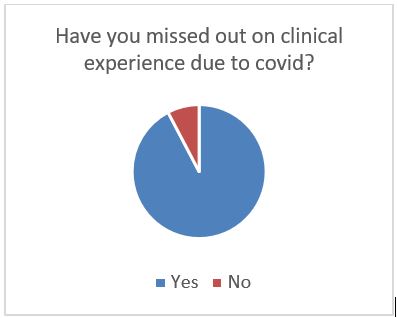
Figure 1: Have you lost on clinical experience due to covid?
The next focus of the survey was assessing clinical confidence and development. Figure 3 shows the respondents confidence in each clinical specialism at the start of the DCT year on a five-point scale, with the option of not-applicable if not relevant to their post. This was followed up by asking ‘do you feel you are progressing as a clinician?’. Results to this were mixed, with 7 trainees agreeing or strongly agreeing, 5 disagreeing and 1 trainee being neutral.
Another theme of the questions was related to this specific DCT year. The first question asked the rationale for doing this DCT year, the overwhelming response was related to career progression to speciality training followed by non-clinical development opportunities (Figure 4). This was followed by asking did they feel they had made the correct choice to do DCT this year?’ results were generally positives with 8 people agreeing, 5 neutral responses and 0 negative. However, there was a degree of altered expectations for the year with 77% of respondents expecting an altered DCT experience this year.

Figure 2: Confidence scales for job appropriate specialities
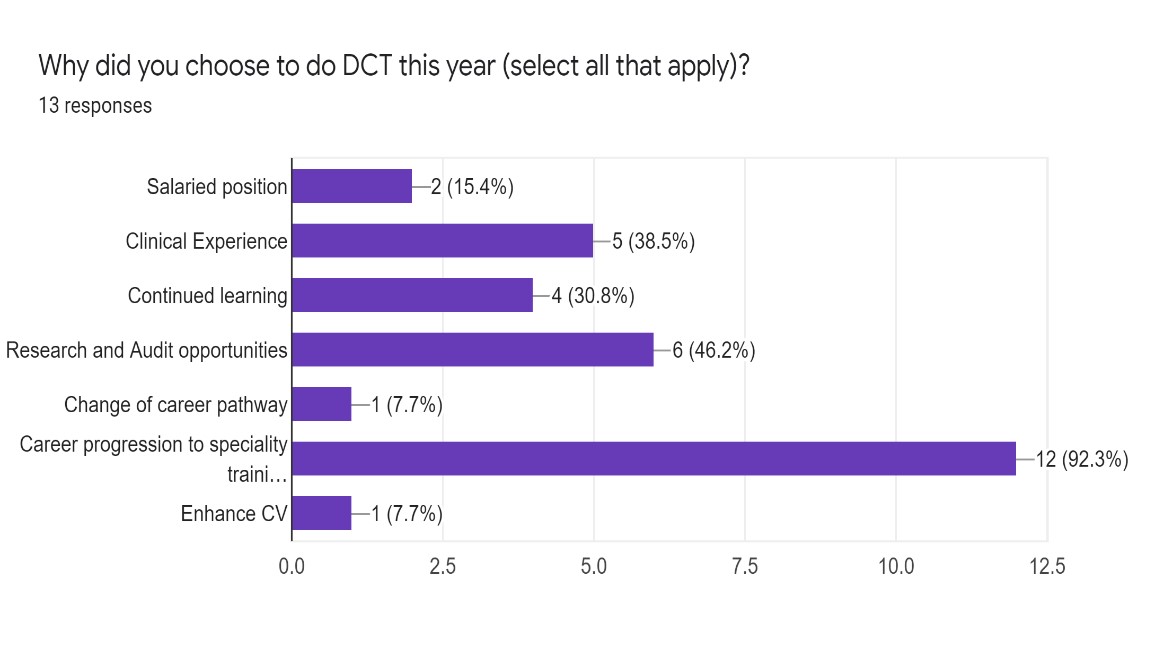
Figure 3: Rationale for a hospital training job
The final focus of the questionnaire was the overall career aspirations of the trainees. Amongst the group, the overall desire was to enter a speciality training post, with 11 responses indicating this as their main career goal, the remaining 2 responses were undecided. Regarding their overall attitude towards dentistry as a profession, 7 people felt like the pandemic had changed their overall outlook compared to 6 who didn’t.
Focus Group
DCTs spread from DCT1 and 3 were interviewed to gain an insight into how COVID-19 has affected their previous, current and potential future training posts. No DCT2s were involved with this focus group. From the responses key themes were identified. The first overarching theme displayed by the group was how COVID-19 has reduced clinical capacity. How this has affected DCTs training and development is displayed in Figure 5.
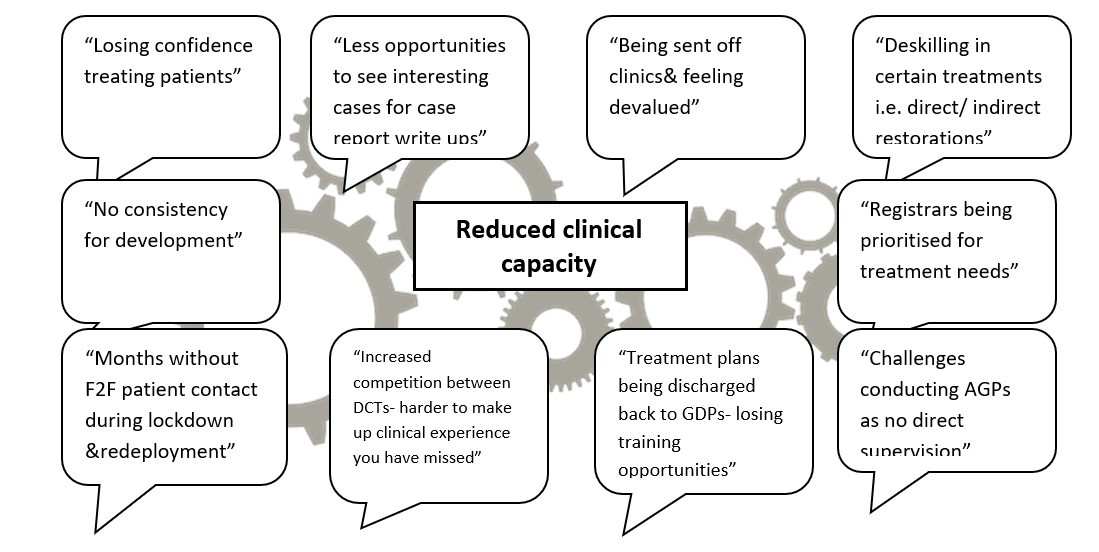
Figure 4: Focus group discussion on the impact of reduced clinical training
The group was asked if they could identify any positives from working during the COVID-19 pandemic either in their professional or personal lives. 7 out of the 8 individuals could identify positives. Whereas 1 individual was unable to identify any positives that had resulted from COVID-19.
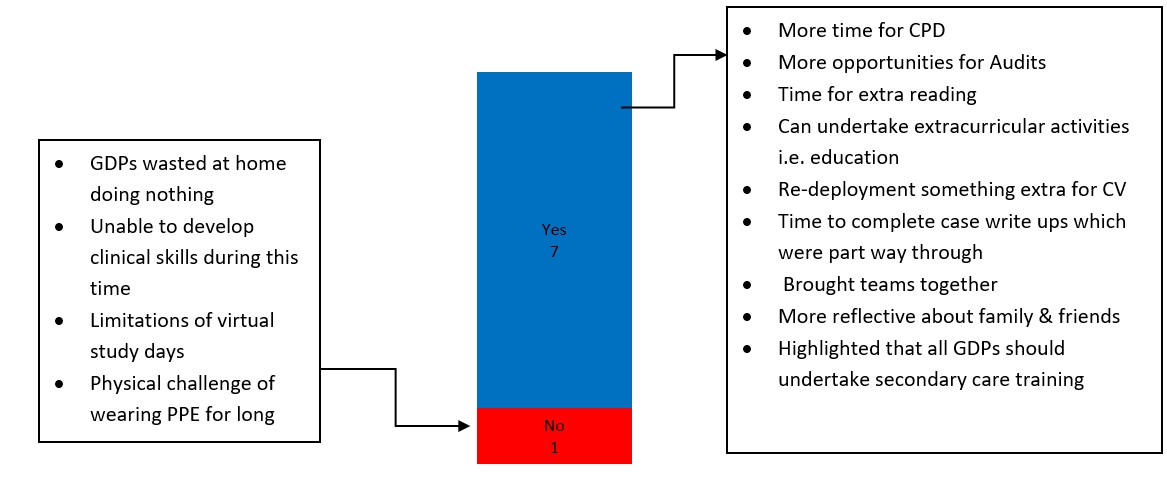
Figure 5: Could you identify positives from the pandemic on your career?
The group was asked about how COVID-19 has influenced their career aspirations and how it has affected their outlook on their training pathway. There were stark differences between the answers and impressions given for DCT1s & DCT3s (Table 1).
Table 1: Comparison of career impact between DCT1s and 3s
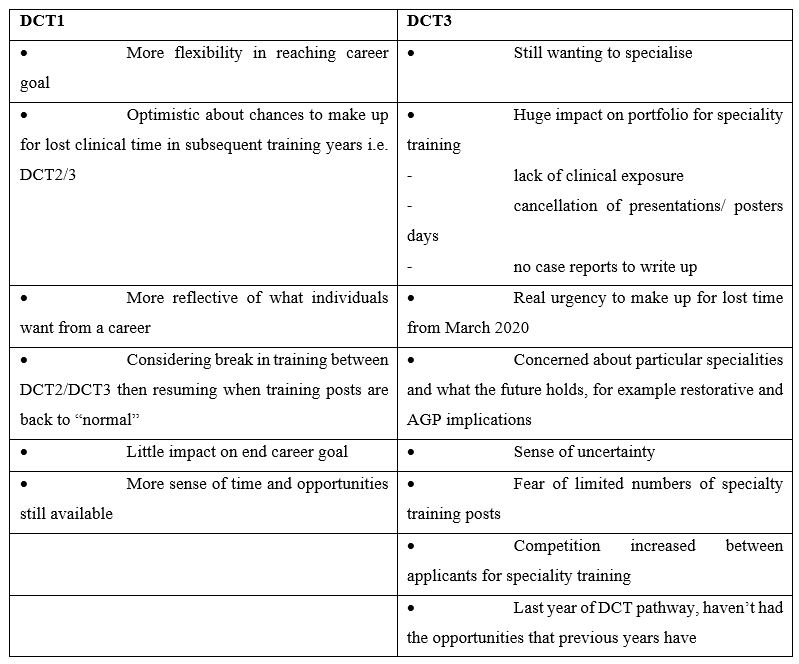
The final theme identified was the training needs of the DCTs and how individual needs have been affected. The overall impression was DCTs felt their learning needs were largely unaffected, DCTs were still expecting to make up for lost clinical time which occurred during lockdown plus develop as expected during this post. DCTs who were previously self-employed or not in training posts prior to September 2020, were content in gaining any experience during their DCT year (Figure 6).
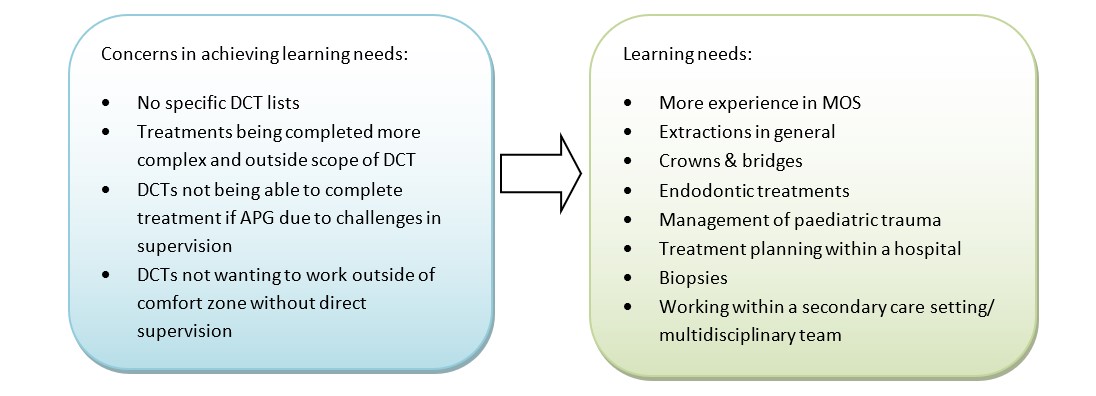
Figure 6: Identified learning needs and concerns regarding achieving them
Results: Round Two
Questionnaire
In February 2021, a second modified questionnaire was sent to the same group that answered the first questionnaire. Questions were modified to reflect the time that had elapsed whilst focussing on the same overarching themes. The first focus was on the clinical nature of training, asking were the participants still missing out on clinical experience due to the ongoing pandemic. Results largely mirrored first cycle, with 84.6% of respondents feeling they were still missing out clinically. Participants were then asked to expand on specific clinical areas that were reduced. Common areas that were reduced were surgical experience, complex restorative treatments, and three responses feeling they were missing on all clinical treatment (Figure 7).
The next area of focus was related to the confidence and development of the trainees. The same five-point scale was used for each of the specialities relevant to the departments within the dental hospital (Figure 8). Results were similar to the first round with a general upwards trend with fewer responses in the lower two grades. The follow up question of ‘do you feel you are progressing as a clinician?’ was repeated from the first survey produced more positive results with seven agreeing or strongly agreeing, five neutral responses and only one response disagreeing.

Figure 7: Speciality Specific Confidence after 6 months
As the trainees were now nearly halfway through their year the next set of questions focussed on reflecting on the year from a learning perspective. The first question related to the learning needs identified in cycle one, asking if there were still outstanding needs from the start of the year, four respondents agreed with the common response being surgical procedures and restorative. Three respondents had identified new needs since the year has started- surgical extractions, endodontics and oral medicine differential diagnoses. When asked about what skills have been developed the most the recurring answers related to overall assessment and treatment planning, communication skills and the ability to utilise remote clinics effectively. Of the personal development plans that the trainees had created at the start of the year, only 53.8% expected to be able to complete all objectives, with the areas of concern relating to surgical procedures and conference presentations.
Finally, participants were asked about their overall perspectives regarding careers within dentistry. One notable change from the first cycle was in participants career goals, with a greater number either undecided or wanting to work in primary care and only just over half of the respondents wanting to pursue speciality training. 38.5% respondents said that the ongoing pandemic has affected their overall outlook on dentistry as a profession.
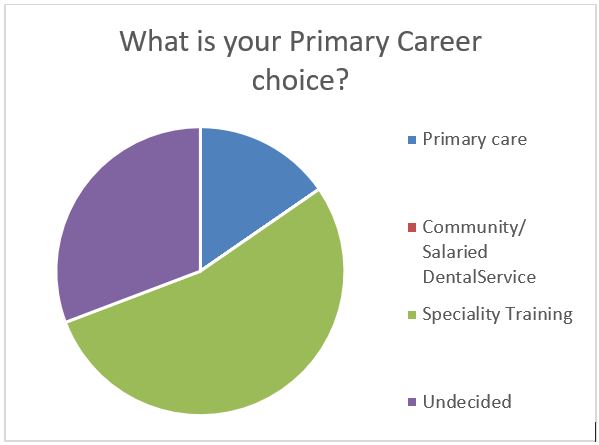
Figure 8: Career Aspirations
Focus group
One month following the distribution of the second questionnaire, a follow up focus group took place. Questions were based on answers which were given in the second questionnaire and the previous focus group (Appendix).
Three main themes were identified within the group:
- Continuing impact of COVID on career pathway
- Development of clinical skills
- Learning needs
Below highlights some of the opinions shared in relation to how COVID is continuing to impact and influence future career decisions (Figure 9, 10). For those who were intending to specialise, COVID and the change in application process hasn’t deterred their desire to continue with the pathway. However, for those who were originally undecided are now more inclined not to purse specialty training given the shortage of jobs and unwillingness to apply to jobs further afield.
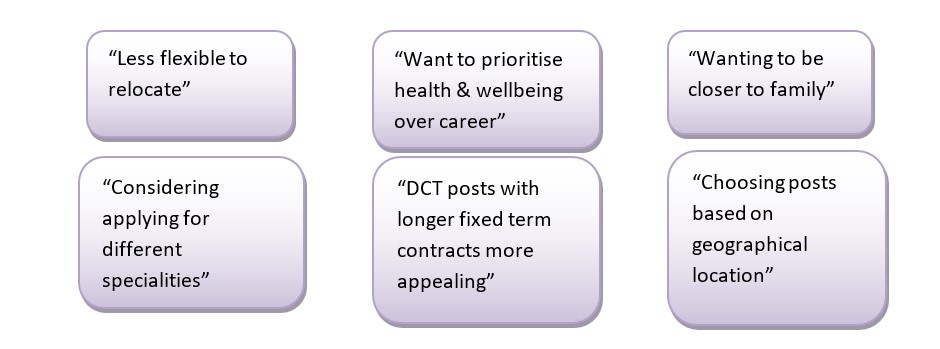
Figure 9: COVIDs impact on future career decisions
Leading on from careers DCTs were also asked the impact of COVID of the dental profession and if the overall outlook on the profession had changed (Figure 11).
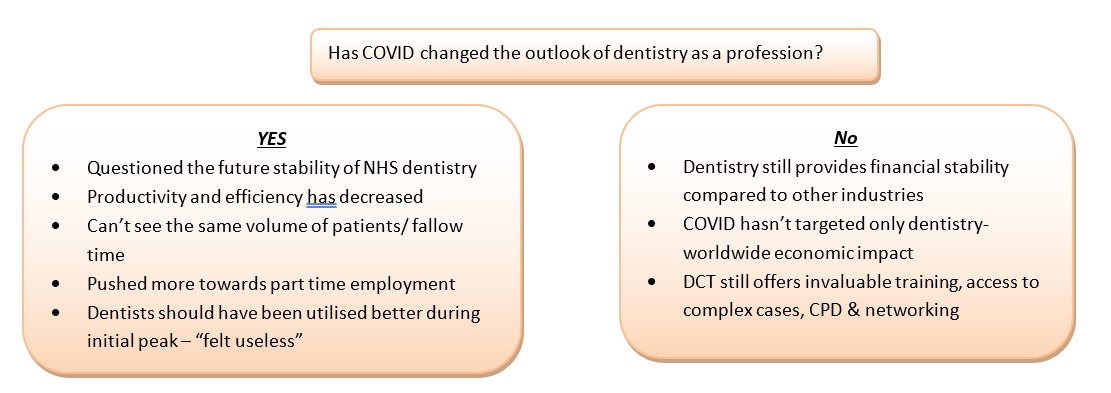
Figure 10: COVIDs impact on dental as a profession
The table below summaries DCTs opinions on what changes have been made clinically since the last discussion, exposure to cases and how DCTs are viewing their progression.
Table 2: Summary of DCTs opinions on clinical changes, exposure to cases and progression over the last 6 months
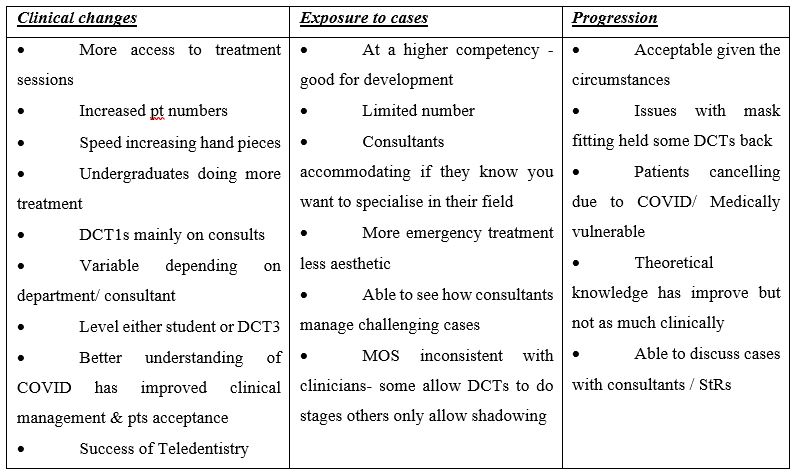
Discussion
From an educational perspective, it is apparent that the covid pandemic has had a significant impact on learning needs. The majority of outstanding learning needs were related to clinical activity that had been reduced or stopped. Positives were identified in relation to educational development out with clinic. At the start of the year the group had outstanding areas of development brought on by the pandemic but were optimistic regarding these being met. However, when the year had progressed nearly half of the group believed they would not be able to meet the targets in their personal development plans.
One key point that has been highlighted from the questionnaires and discussion is the prolonged reduction in clinical experience. A majority of the group had reduced experience in previous posts coinciding with the first wave of the pandemic. It was expected that clinical dentistry would return to full capacity over the course of the 6 months of this study. However, dentistry was faced with a worsening pandemic and recurring lockdowns, thus slowing the transition to full capacity. Overall, there was overall progression in clinical confidence but areas most affected were those that were aerosol generating such as fixed prosthodontics and minor oral surgery. One challenge associated with reduced number of patients was the uncertainty of the role of dental core trainees within a teaching hospital. Trainees felt with an absence of set lists for DCTs trapped between senior trainees and undergraduate students with no specific clinical role.
Individuals’ attitudes to career aspirations were one that interestingly changed over the 6-month period. Initially, the majority of the group wanted to commence speciality training posts, with 11 DCTs highlighting this in the questionnaire which dropped to 6 DCTs in the follow up cycle. This then meant that more DCTs were either undecided or aiming to work in primary care. This shift in attitude appeared to be due to a concern of fewer speciality posts and unwillingness to apply to posts further afield. Additionally, DCTs want to explore alternative options instead of a formalised training pathway. For those who were either in the process of applying to speciality training, or aiming to apply next year, expressed a change in their attitude towards the speciality pathway. As a result of COVID individuals are prioritising posts based upon geographical location and considering applying to different specialities to be closer to family. Travel restrictions that have been in place during COVID have had a direct impact on individuals being less flexible to relocate to places which are a considerable distance from family. Additionally, DCT posts which are of longer fixed term contracts are becoming more desirable as they provide more training and financial security. For those who were intending to specialise, COVID and the change in application process has had no impact on their desire to continue with the pathway. The overall opinion the group had in relation to change in career aspirations, stemmed from the impact COVID has had on individual’s perception of life and wanting to prioritise health and wellbeing over career progression. There was an overarching impression that “life is too short” and DCTs now have a better understanding of what is important in their own lives.
No meaningful trends could be drawn between genders, as both genders were not represented equally in either the questionnaires or focus groups, with the majority of DCTs being female. It was noticed that DCTs who were older and had a background working in primary care had a more realistic expectation of the year and the impact COVID will have on clinical exposure. Additionally, these DCTs felt less stress and pressure compared to working in primary care as responsibilities are shared with consultants and the larger hospital framework. It was felt that this year had been a great year to do DCT as the financial burden felt by associates is not mirrored in hospital roles. DCT1s appeared to be less affected by the prospective of reduced clinical exposure as it was felt they had additional years to remedy this prior to specialty applications. When compared to DCT3 who were largely concerned about the impact the pandemic has had on their portfolios, presentations at both regional and national levels and ability to find cases for reports. There was a sense of urgency to make up for the lost clinical time from March 2020, and a fear that previous DCT3’s would be further ahead clinically. The uncertainty of COVID appeared to have a larger effect on DCT3 as this was their last year before commencing Registrar training.
Conclusion
- COVID has resulted in reduced clinical experience as a result of reduced clinical capacity
- Development of clinical skills in particular surgical extractions and restorative treatments have been directly impacted
- Learning needs for the year have largely been unaffected however, it was found that some learning needs are still outstanding due to the pandemic and will not be achieved
- 54% of DCTs still desire to specialise within an area of dentistry. This was a reduction compared to when DCTs were first asked, with a greater number of DCTs either undecided or wanting to work in primary care
Appendix
Questionnaire Round one:
- Gender
- Age
- What did you do before this post?
- What is your career goal?
- Confidence scales for all specialities (option for N/A)
- Was your re-deployment? - if so where to?
- Do you feel like you have missed out on clinical experiences due to COVID? If so what treatment in-particular?
- What do you aim to get out of this training year?
- Do you think the dental hospital is an ideal environment to target areas you have missed due to COVID?
- Do you feel you made the correct choice in choosing DCT given the current challenges COVID poses?
- Do you feel there are any positives brought by covid in relation to training and your current post?
- Do you feel like you are progressing as a clinician?
- Has COVID affected your outlook on dentistry as a profession?
- Has the impact covid has had on your training resulted in a more competitive nature between DCTs?
Questionnaire Round Two:
Focus Group Round one:
- Has your training been affecting by COVID? And how
- How has this impacted on your development
- What skills have been adversely affected or what skills have benefitted from COVID
- Do you feel like your previous post was negatively impacted by COVID and how?
- DCT3 question: How has your speciality been affected by COVID?
- Oral medicine
- Oral surgery
- Paediatric
- Special care
- Restorative
- If you were redeployed what positives did you gain from this experience?
- Has it resulted in you being more flexible/ adaptable? Etc
- Has COVID affected your career aspirations
- Have your learning needs changed?
- Do you feel adequately supported to reach your learning needs this year?
Focus Group Round Two:
- Is COVID changing your outlook on dentistry as a profession?
- The previous group discussion identified a strong desire for specialising. How have speciality applications been affected by the covid pandemic?
- Have your career aspirations been changed due to COVID?
- How has clinical work changed since the first discussion? any improvements or worsening
- Is reduced Clinical capacity still affecting your development?
- Are you being exposed to the cases that you want?
- Are you progressing at a rate acceptable to you?
What do you think could be done differently to help you achieve your LN’s given the limitations of COVID
References
- World Health Organisation. WHO Director-General's opening remarks at the media briefing on COVID-19, 2020. [Accessed 11th January 2021].
- Gamio L. The Workers Who Face the Greatest Coronavirus Risk, 2020. [Accessed 11th January 2021].
- Hurley, S. Neligan, M. Issue 3, preparedness letter for primary dental care, 2020. [Accessed 11th January 2021].

